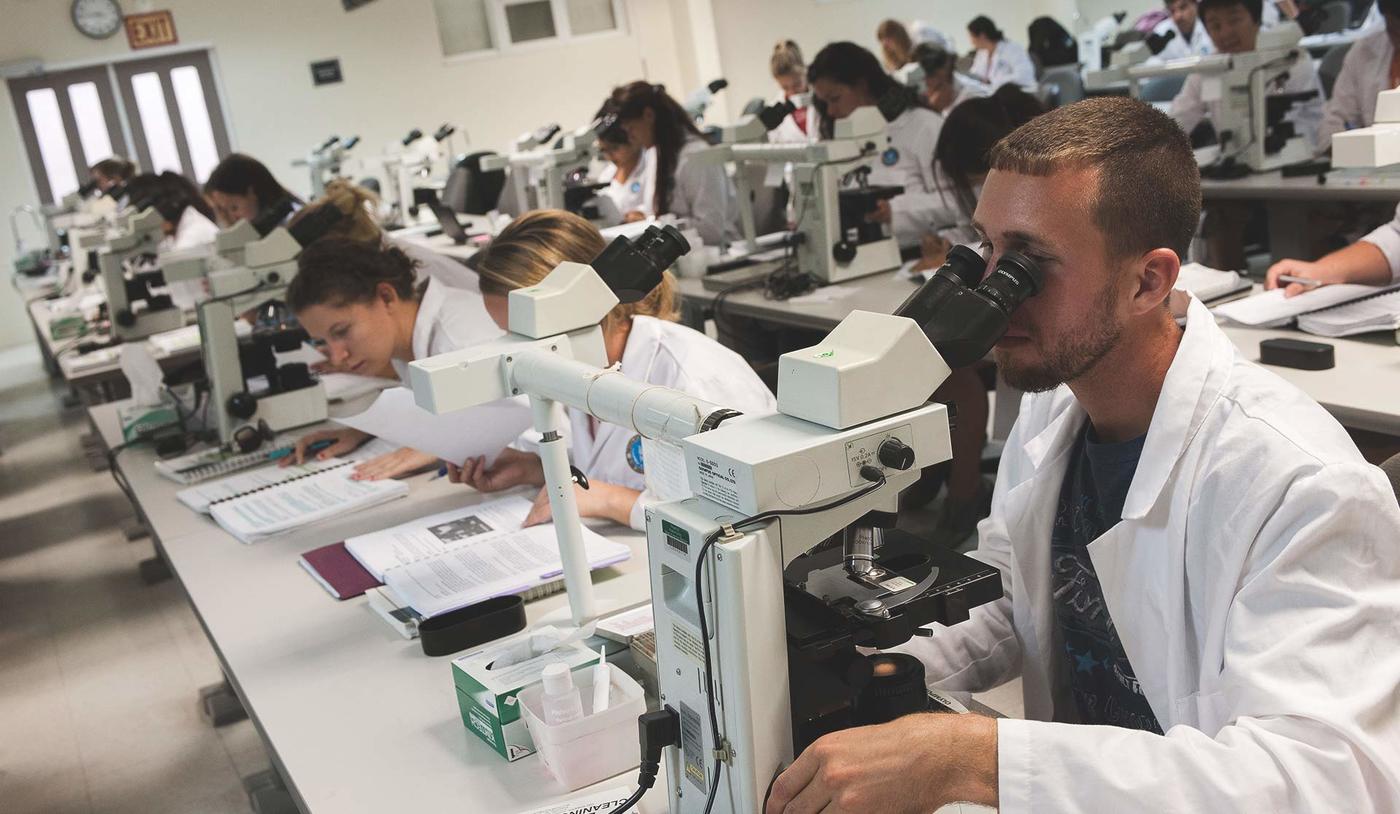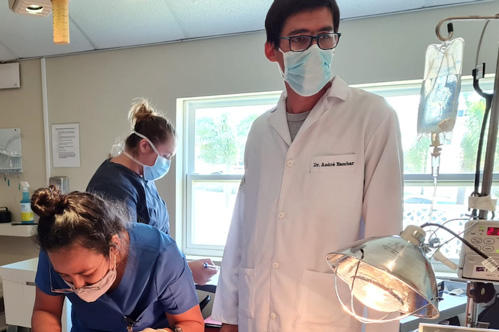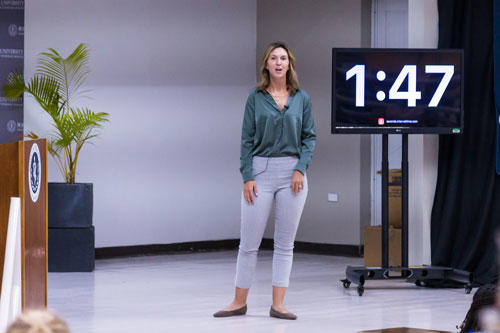"You’re ready. You’ve done your research, you’ve seen the photos of picturesque islands and exotic animals, and now you’re considering attending one of the veterinary schools in the Caribbean, but you are still concerned about the reality of studying abroad. Maybe you’ve encountered the occasional negative comment online about Caribbean vet schools. Are the statements true?
To decipher fact from fiction, we leaned into the experiences of two current Ross University School of Veterinary Medicine (Ross Vet) students in our Doctor of Veterinary Medicine (DVM) program to dig into a few of the biggest myths about Caribbean veterinary schools.
The Truth About Veterinary Schools in the Caribbean
Myth: Caribbean vet schools accept anyone
Truth: Ross Vet takes a holistic approach to admissions- accepting students with the GPA, passion, and determination to be strong DVM candidates
Lauren Darwin, class of ‘22
Applying to and choosing a veterinary school is a personal decision. I applied to Ross Vet because the University aligned with my personality better than any other school did.
Before joining the University, I heard the rumors that Ross Vet ‘accepts everyone’ and it’s ‘only for people who can’t get into State-side schools’. But the reality? I applied to Ross Vet with grades that were competitive to apply anywhere. I chose to attend because of my interests and Ross Vet’s belief in my future potential.
During my interview with Ross Vet, we discussed my GPA, my experience, and my future goals in veterinary medicine. We talked about my experience working in Thailand and my interviewer was genuinely interested in who I was. It was like talking with an old friend. I knew for sure at that point that it wasn’t only about my GPA, but it was more importantly about who I was as an individual and my unique point of view that I could bring to the table.
The truth of the matter is that NO vet school is easy to get into. As for the market being oversaturated with graduates from Caribbean veterinary schools. I have yet to meet a Ross Vet student or “Rossie” that didn’t already have a job lined up before they even graduated. We constantly have speakers coming down to Ross Vet and actively seek out Rossies because of the fantastic experiences they have had with them.
Katherine Bausmith, class of ‘22
Ross Vet takes a lot of time to carefully interview and select students that they believe have great potential to be amazing doctors and will succeed at adapting to the unique lifestyle and learning experiences at the University. Contrary to popular belief, it is not uncommon for prospective students to be turned away if they do not fit the specific requirements of Ross Vet.
The University genuinely cares about you as an individual student, rather than identifying you as a test score.
Myth: Caribbean vet schools are too expensive
Truth: When you attend a U.S. school out of the state, you pay full out-of-state tuition. That out-of-state tuition could be be higher than Caribbean vet school tuition.
Katherine Bausmith, class of ‘22
Yes, veterinary school is expensive, so I can understand why some may feel as if they are “paying for a degree”, but one has to consider all of the costs that go along with the veterinary curriculum and island living. Vet school in the Caribbean and cost of living, and pursuing a veterinary career is by no means easy or inexpensive, but it is worth it if you have the passion and drive.
Myth: The curriculum is sub-par when compared to programs in the U.S.
Truth: Ross Vet is accredited by the American Veterinary Medical Association Council on Education (AVMA-COE)*, the same accrediting body as U.S.-based programs.
Lauren Darwin, class of ‘22
Curriculum-wise, we are all taught the same material for the first three years. The last year we are placed into an AVMA accredited* affiliate school in the U.S. or internationally in Canada, Australia, or Europe.
When I talk to my friends in state schools, we are using the same textbooks. Some of my Ross Vet professors even wrote those textbooks. We are taking the same classes. We are learning the same material. And when it comes to getting the clinical training, we are right beside our stateside counterparts learning the hands-on portion.
Katherine Bausmith , class of ‘22
If anything, Ross Vet provides even more unique, hand-on experiences than the average U.S. veterinary student would receive. For example, at Ross Vet, students are provided the opportunity for hands-on labs with live animals as early as the first semester, whereas this experience may be delayed until years two or three for some U.S. students.
Aside from classes and labs, I have also had several personal experiences that have changed my life as a veterinary student. I am a member of Volunteers for Intercultural and Definitive Adventures (VIDA), which allows students to travel around the island under the supervision of a veterinarian to provide free health services to island pets in need. I have always loved doing volunteer work, and this unique experience helped me understand clinical and non-profit veterinary medicine. It also strengthened my personal relationship with the local community of St. Kitts and Nevis.
I truly believe that these one-of-a-kind experiences are ones that can only be found at Ross Vet, and have made me a stronger, more resilient veterinary student.
Myth: Island-life and the challenges that can come with attending Caribbean vet schools is not worth it
Truth: Island-life prepares you to be more diverse and resilient as a global health leader
Lauren Darwin, class of ‘22
I decided to move to St. Kitts during my undergraduate studies to experience island life while working on some research projects. I absolutely fell in love with the island and the wildlife. I would do the dishes and look out to Vervet monkeys in front of my window. I’ve been lucky enough to see whales from campus jumping out in the Caribbean Sea as they were migrating through. I can easily go snorkel five minutes from my house and know that I’m going to see a sea turtle. You can’t get this experience everywhere.
I truly believe Rossies are either magic or superheroes, and I am so proud to call myself one. It is not for everyone, that’s for sure. But for those of us who choose this route to receiving a DVM, we know there’s no place like St. Kitts and there’s no place like Ross Vet.
Start your journey now
Now that we’ve debunked some of the myths about attending a Caribbean vet school, you may be curious about what’s next? Be sure to read our blog What is Vet School Like?, where we’ve put together some of your Frequently Asked questions to help you as you begin your journey.
Interested in learning more about a degree in veterinary medicine at Ross Vet?
*Ross University School of Veterinary Medicine confers a Doctor of Veterinary Medicine (DVM) degree, which is accredited by the American Veterinary Medical Association Council on Education (AVMA COE), 1931 N. Meacham Road, Suite 100, Schaumburg, IL 60173, Tel: 800.248.2862. For more information please visit: https://www.avma.org/education/accreditation-veterinary-colleges.
The AVMA COE uses defined standards to evaluate veterinary medical education programs, including facilities, clinical resources, curriculum, faculty, student outcomes and research programs. The standards are interpreted and applied by the AVMA COE-accredited veterinary medical education programs in relation to its mission.








